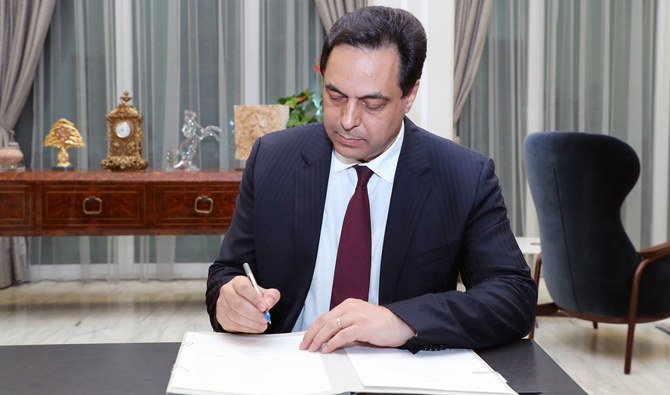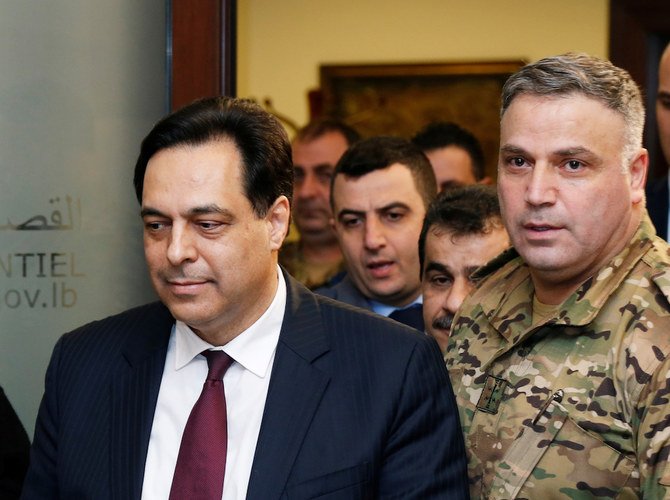



BEIRUT: A new government was announced in Lebanon late on Tuesday, breaking a months-long impasse amid ongoing mass protests and economic turmoil.
Hassan Diab, a 60-year-old professor at the American University of Beirut, now heads a Cabinet of 20 members, mostly specialists backed by political parties.
The move, which comes three months after former Prime Minister Saad Hariri resigned, is unlikely to satisfy protesters. They have been calling for sweeping reforms and a government made up of independent technocrats that could deal with the country's crippling economic and financial crisis, the worst the country has faced in decades.

Lebanese President Michel Aoun, left, meets with Prime Minister-Designate Hassan Diab at the Presidential Palace in Baabda, east of Beirut, Lebanon, Tuesday. (AP)
Shortly before the Cabinet was announced, thousands of people poured into the street closing major roads in Beirut and other parts of the country in rejection of the new government.
Their anger was directed at political groups, saying they had named the new ministers.
“It’s time to get to work,” Diab said in a speech addressing the country following the announcement.
He saluted the protesters in the street and vowed to “work to fulfill your demands,” claiming that his was the first government in the history of Lebanon to be made up entirely of technocrats. He insisted the 20 ministers were specialists who had no political loyalties and were not partisan.
Diab appealed to citizens to help the government implement a “rescue program” and said this Cabinet has the “capability and qualifications, will and commitment” to carry it through.
Among the ministers named were five women, including the minister of defense and deputy prime minister.
The heads of the main ministries include career diplomat Naseef Hitti for the foreign ministry. Economist Ghazi Wazni was named finance minister and former army Gen. Mohammed Fahmi was named minister of the interior. Zeina Akar was named minister of defense and deputy prime minister.
Negotiations had been deadlocked since Hariri stepped down at the end of October, amid widespread street protests.
Diab has struggled to reconcile the demands of rival political parties and appoint an administration.
Despite demands by protesters that politicians be excluded from the Cabinet, it is thought that many of the technocrats in the new administration have been nominated by political parties. Hezbollah had nominated two new ministers.
Hilal Khashan, a professor at the American University of Beirut, said all proposed candidates were linked to established political parties.
“A Cabinet made up exclusively of technocrats is wishful thinking,” he said. “Behind every candidate, there is a political party backing their nomination.”
Political sources said the main sticking point had been over the number of seats sought by Gebran Bassil, who heads the Free Patriotic Movement (FPM) and is the son-in-law of President Michel Aoun.
FPM, the largest Christian party, had been seeking a third of the Cabinet’s seats, which would give it the same veto power it had under the previous administration.
Suleiman Frangieh, leader of the Christian party Marada, cast blame for the delay squarely on Bassil and the FPM.
“His greed and ambition are obstructing the government ... let Gebran Bassil form the entire government and may God bless him,” said Frangieh, who wanted to nominate two Cabinet members but was restricted to one.
“He is pushing us toward a precipice and saying, if you are not with us then you are to blame for the obstruction. If things continue this way, it will lead to catastrophe.”
Lebanese are pinning their hopes on a new government to spearhead reforms, unlock billions in international aid, and help stabilize a plummeting Lebanese pound that has lost over a third of its value. A dollar liquidity crisis and restrictions on dollar transactions has compounded the crisis.
“The task that awaits any Cabinet during this serious period is herculean,” said Karim Mufti, a political scientist. “In view of the multidimensional nature of the crisis, it seems difficult to envisage short-term solutions to the country’s financial, economic and social problems.”
With AP and additional reporting by Najia Al-Houssari